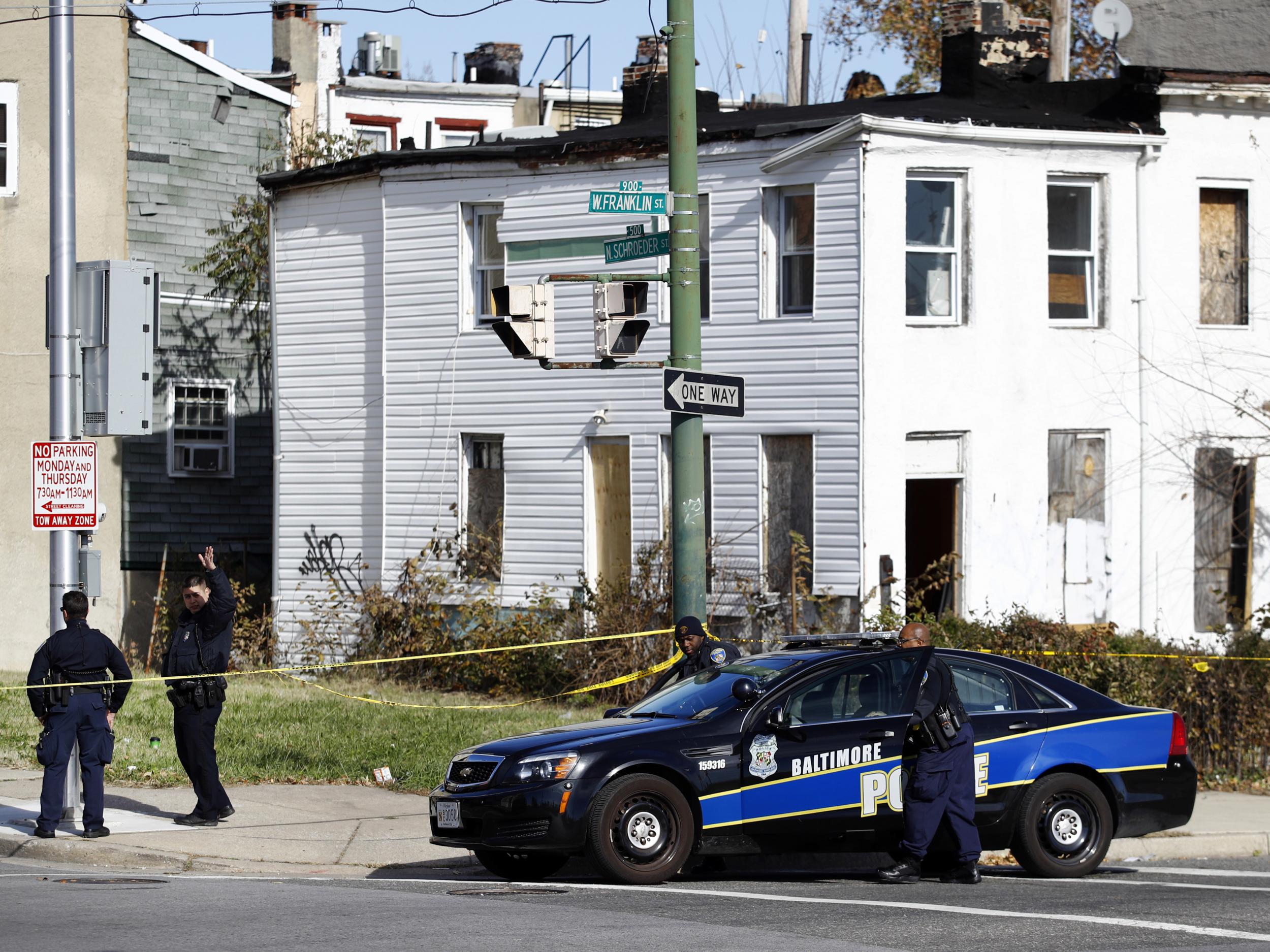Baltimore detective shot in head with own gun in brawl with suspect day before grand jury testimony
Sean Suiter dies clutching radio day before scheduled court appearance to address police corruption and the city's infamous drugs trade

Your support helps us to tell the story
From reproductive rights to climate change to Big Tech, The Independent is on the ground when the story is developing. Whether it's investigating the financials of Elon Musk's pro-Trump PAC or producing our latest documentary, 'The A Word', which shines a light on the American women fighting for reproductive rights, we know how important it is to parse out the facts from the messaging.
At such a critical moment in US history, we need reporters on the ground. Your donation allows us to keep sending journalists to speak to both sides of the story.
The Independent is trusted by Americans across the entire political spectrum. And unlike many other quality news outlets, we choose not to lock Americans out of our reporting and analysis with paywalls. We believe quality journalism should be available to everyone, paid for by those who can afford it.
Your support makes all the difference.A Baltimore police detective was shot in the head with his own gun at close range while struggling with a man and died with his radio still clutched in his left hand, the city's top law enforcement official said on Wednesday.
Detective Sean Suiter's death came a day before he was set to testify before a grand jury in an ongoing federal investigation of police corruption and drug shakedowns by an elite gun recovery unit.
Police Commissioner Kevin Davis said he was assured by prosecutors and the FBI that Suiter, an 18-year veteran of the force, was not a target of the investigation that has led to the indictments of eight current and one former officers. Four have pleaded guilty to racketeering charges.
Davis said Suiter's testimony was to have been about an incident several years ago involving some of the indicted officers. The commissioner sought to dispel notions Suiter was targeted the afternoon of Nov. 15 and said evidence gathered so far refutes the notion of a conspiracy.
“The encounter with a man was a spontaneous observation of a man behaving suspiciously and a spontaneous decision to investigate his conduct,” Davis said. But, he said, “I understand the speculation that exists.”
Suiter and his partner were in the Harlem Park neighbourhood canvassing about a December 2016 triple killing when they happened to twice notice a man acting suspiciously within a span of about 20 minutes, Davis said.
The department's chief spokesman said Suiter, 43 and a married father of five, was not lured to Bennett Place, where he was shot, and that he had no appointment set there. Davis said Suiter confronted the man in an empty lot between two rowhouses but did not say what made him stand out.
The mystery surrounding Suiter's death continues after a week with no arrests, no detailed description of the shooter and the fact that it appears only one gun was involved. A funeral for Suiter, who is originally from the District of Columbia, is scheduled for Wednesday.
Davis said there was evidence found on Suiter's shirt that indicated a struggle he called “brief and violent” and lasted mere seconds. Suiter made a radio transmission before he was killed that included what Davis said he believes are gunshots in the background. The commissioner said the words in that call have not been deciphered but that the recording is being analysed with help from the FBI.
“He was clearly in distress,” Davis said of the sounds on Suiter's radio call.
Authorities have previously stated that investigators found three shell casings that matched Suiter's weapon, which was recovered at the scene. An autopsy Sunday ruled the death a homicide, Davis said, and also provided information about the trajectory of the bullet that caused police to return to the crime scene for another search. That repeat search recovered the bullet that killed Suiter, Davis said on Wednesday.
Suiter's partner, who has not been named publicly by the department and is considered a police witness in the shooting, Davis has said, took cover at the sound of gunfire and called in the shooting on his cellphone.
The partner has been continually talking with detectives, Davis said, and provided the spare description police said they have of the suspect as a black male wearing a black coat with a white stripe.
A reward for information leading to Suiter's killer has reached $215,000, and Davis urged people to come forward.
In the days since the shooting, police have focused on Harlem Park, a small violent patch of depressed real estate west of downtown among the most violent neighbourhoods in a city that ranks near the nation's top in homicides per capita. Police kept the crime scene active for five days, restricting residents' movements as they searched for the suspect. The neighbourhood is marked by more vacant houses than occupied homes.
“There is nothing we won't consider,” Davis said. “Right now, the evidence that's available to us is indicative of a homicide.” He said it would entirely plausible for it to be coincidental that Suiter was killed in a random encounter unrelated to his pending grand jury appearance.
“It's a very dangerous area,” Davis said. “He was following up on a brutal murder in 2016. Detective Suiter was not interviewing schoolteachers and mailmen.”
The commissioner said conspiracy theories swirling around the investigation are “certainly a distraction for leadership” and are “very hurtful for the Suiter family and friends.”
Suiter was a US Navy veteran who had grown up in Washington and lived with his wife and family in Pennsylvania.
The commissioner said he met with homicide detectives Monday night on the investigation and that “they are determined to get it right.”
The Washington Post
Join our commenting forum
Join thought-provoking conversations, follow other Independent readers and see their replies
Comments